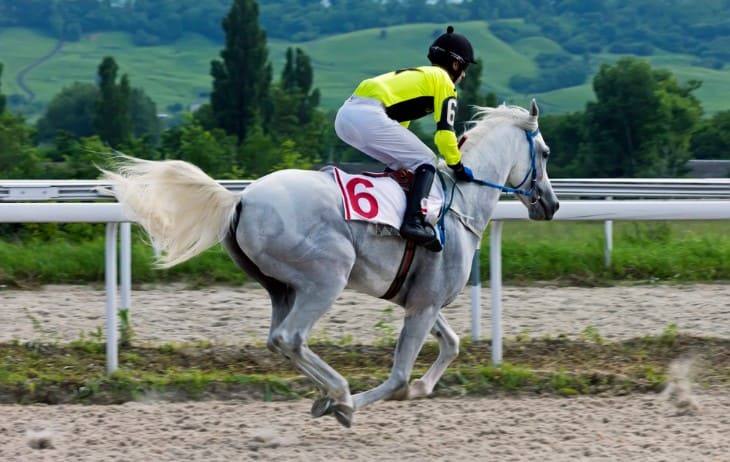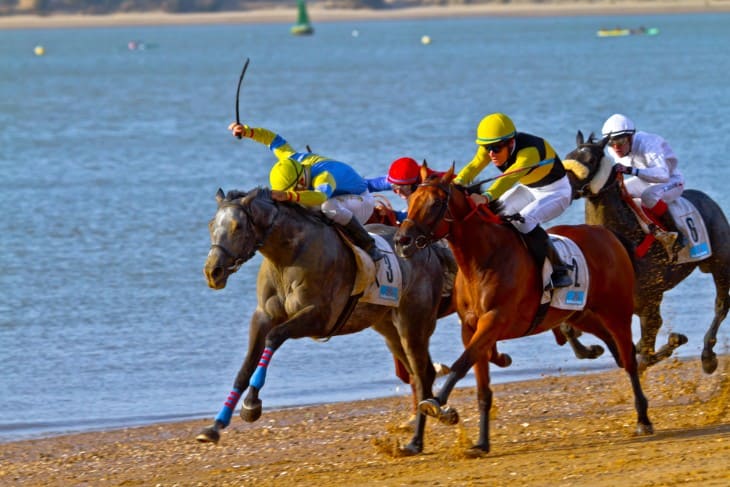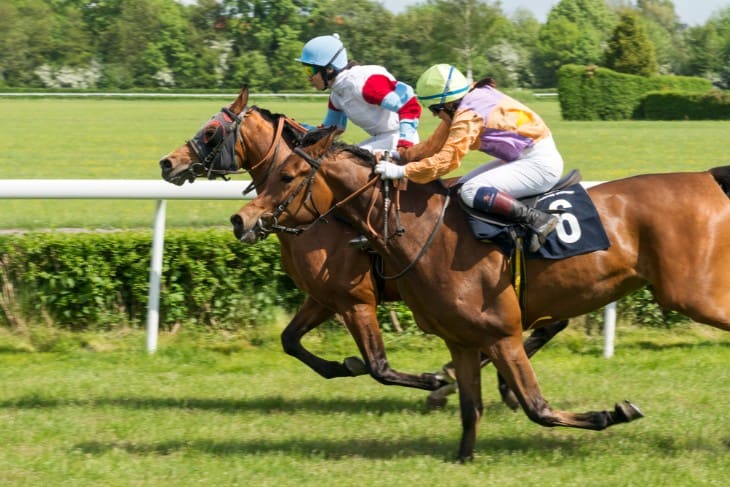- Choosing the Right Horse: What Traits Matter Most
- A Trainer's Role in Equine Development
- Endurance and Strength Training for Horses
- Proper Nutrition: Key Ingredient in Horse Training
- Injury Prevention and Management in Racehorses
- Fostering a Winning Mindset
- Advanced Training Techniques for Jumping and Speed
- The Importance of Regular Health Check-ups and Veterinary Care
- Adapting Training Regimens to Individual Horses
- In Summary
The Aintree Racecourse's Grand National course is famous for being complex and challenging both the rider and the horse. It spans around four miles and two furlongs, making it one of the longest in the world. There are 30 fences, each offering a unique test of skill. Notorious fences include Becher's Brook, The Chair, and the Canal Turn. Each requires specific skills and agility from horses.
Trainers need to understand how each fence works to prepare their horses accordingly during training. This process includes tailoring training programs that address each obstacle's challenges. For instance, trainers must teach their horses to jump at an angle to conquer Becher's Brook. On the other hand, Canal Turn demands quick reflexes as its sharp left turn immediately follows a fence.
Understanding these details is crucial for any trainer who wants their horse to succeed in the Grand National race.
Choosing the Right Horse: What Traits Matter Most
Horse Training for the Grand National starts with choosing the right horse because only some thoroughbred animals are suitable for this gruelling race. Here are some traits that trainers look out for:
- Physical build: A robust physical frame will help a horse cope with the Grand National's toll on its body.
- Jumping ability: Given that Aintree's obstacles are challenging enough already.
- Mental resilience: The atmosphere can be overwhelming at times.
- Stamina and speed: Speed when it counts, but endurance is also needed to last such a long course.
A Trainer's Role in Equine Development
The job of a Grand National Horse Trainer is complex. They can’t just dip their horse in the water and call it a day. They need to develop an in-depth understanding of the way horses think and are built, then use that knowledge to create training routines that maximise what they do best while also keeping them safe. This involves more than physical training, though; mental strength can be just as important as physical strength for the Grand National.
Another significant part of the job is building trust with the horse. They need to know how to read them like a book so they can always tell if something’s off with them and figure out precisely what ASAP. That way, they can work out any kinks or discomforts before it’s too late. On top of that, trainers need to collaborate with veterinarians, nutritionists, and other professionals so their horse gets all-around care.
That all might sound excessive, but if you want your horse to come out strong and confident, you’re going to have to get on that grind!
Endurance and Strength Training for Horses
Horses need more than speed to win races. Stamina is essential when discussing surviving long distances, such as the Grand National race. Trainers build stamina in horses by getting them used to doing long yet slow workouts to increase their tolerance for strenuous activity gradually.
The cardiovascular system also needs improvement – which can be done through short bursts of intense sprinting exercises after a slow gallop session. In addition, horses need strong muscles to propel themselves forward at fast speeds while hopping over hurdles every few metres. Such power can only come from resistance-based training activities like hill climbs.
Of course, too much exercise without proper rest will lead horses to fatigue and injury rather than progress. This is why trainers must allocate enough time for rest periods based on each horse's potential work capacity before pushing them again.

Proper Nutrition: Key Ingredient in Horse Training
How horses are fed can significantly affect their well-being, energy levels, and performance during races.
- Energy-Rich Foods: Whole grains rich in carbohydrates fuel intense workout sessions.
- Proteins: High-quality protein sources such as alfalfa and soybean meal are crucial for muscle development and repair in horses.
- Vitamins and Minerals: Vegetables contain essential nutrients the human body requires to function correctly.
- Hydration: Adequate water intake is critical for horses, preventing dehydration and ensuring peak physical condition.
- Specialised Supplements: The supplement industry is booming thanks to rising global health awareness. Tailored supplements can address specific nutritional needs.
Dietitians work with trainers to develop a diet plan that best suits the horse's needs at its specific age, weight, training intensity, and overall health. Considering these factors also helps design a nutritional plan that supports bone strength and immune system function. Certain supplements may be added based on individual requirements for performance purposes, but this should be done under professional supervision.
This dietary plan must always be flexible and adjusted depending on the horse's performance, health status, and the current training phase. Such changes are vital to ensure that horses receive adequate nutrients in their unique amounts and at the correct times to conquer the Grand National when needed.
Injury Prevention and Management in Racehorses
Horse Training for the Grand National can be dangerous. Horses risk various injuries, from minor strains to more severe conditions. Trainers must take a proactive approach with their animals to prevent such problems. They do this through regular physical examinations, training regiments that don't push too hard, and the use of protective gear during training. The trainers must also ensure their horses stay energised by incorporating different exercises into their routine.
If an injury does occur, though, trainers must handle it swiftly and effectively. This means working alongside veterinarians and physiotherapists to design a recovery plan tailored to the injury. In most cases, rest and rehabilitation are necessary. Techniques include physiotherapy, hydrotherapy, or controlled exercise regimes. The goal is to get the horse back in shape to race again safely.
Fostering a Winning Mindset
While it's important to keep horses physically sound, trainers also know how crucial good mental health can be to performance. A horse's mental state often dictates how well they run on race day, especially in high-stress environments like the Grand National. To build a strong mindset in their horses, trainers expose them to as many stressors as possible before the big day. Large crowds, noise, and starting gates, for example.
Furthermore, exposure therapy for horses is a one-on-one bonding session between horse and trainer. The two work together free of distractions and form trust by understanding each other's weaknesses and strengths.
Advanced Training Techniques for Jumping and Speed
A big part of training horses for the Grand National is personalising their training. Recognizing that every horse has strengths, weaknesses, and character is vital to practical training. The customization of training involves several important things:
- Assessing physical capabilities: Assessing each horse's natural speed, endurance, and jumping ability to determine what areas need work.
- Mental and temperamental factors: Consider the mental capacity and behaviour trends of the horses so that the method can be adjusted accordingly.
- Individual health needs: Training them in a way that accommodates any illnesses they may have.
- Monitoring progress: Continuously checking on how much they've improved while making changes to the plan as required.
With this approach, every horse will receive the best possible training. By focusing on exactly what each horse needs, trainers are able to bring out their fullest potential, which will then help them prepare better for the unique challenges of the Grand National.

The Importance of Regular Health Check-ups and Veterinary Care
Regular health check-ups and veterinary care are essential to Horse Training for the Grand National. The intense training sessions and racing put horses at risk of various health problems, which is why regular medical assessments are necessary.
Early detection and treatment of such issues will prevent them from escalating into more severe conditions. Routine examinations, dental check-ups, vaccinations, and parasite control are some areas that fall under veterinary care. These methods ensure your horse remains healthy and fit throughout its training period.
Veterinarians also play an essential role in managing any injuries or illnesses that might occur during the training period. They may recommend a rest period or rehabilitation, prescribe medication, or perform surgical procedures if necessary. A good relationship between trainers and veterinarians is vital because they work together to maintain the horse's health. This ensures your horse remains in optimal condition, both physically and mentally, to train and race.
Adapting Training Regimens to Individual Horses
Tailoring training programs based on each horse's capabilities is another crucial aspect of Horse Training for the Grand National. Every horse has strengths, weaknesses, temperament, speed, endurance, etc., so it's only logical to design a training program specifically suited for them. Some considerations include:
- Physical Capabilities: Evaluate their natural speed, endurance, and jumping ability to determine where to focus on improving.
- Mental Factors: Consider their resilience and behavioural tendencies when developing a technique you want them to master.
- Health Needs: Design a program that accommodates their health concerns while incorporating recommended exercises.
- Progress Monitoring: Regularly assess their improvement rate in the above-mentioned areas and make necessary adjustments.
This personalised approach ensures each horse receives appropriate training. Focusing on what they need rather than what you think works best will maximise their potential in racing.
In Summary
In conclusion, reaching the success of the Grand National is challenging. Horse Training for the Grand National requires meticulous planning and a deep understanding of a horse's physical and mental needs. The techniques discussed above ensure their health and well-being from when they are brought in for training till they cross the finish line. Such a prestigious race demands comprehensive preparation, which includes exercise, nutrition, health care, and injury management.








